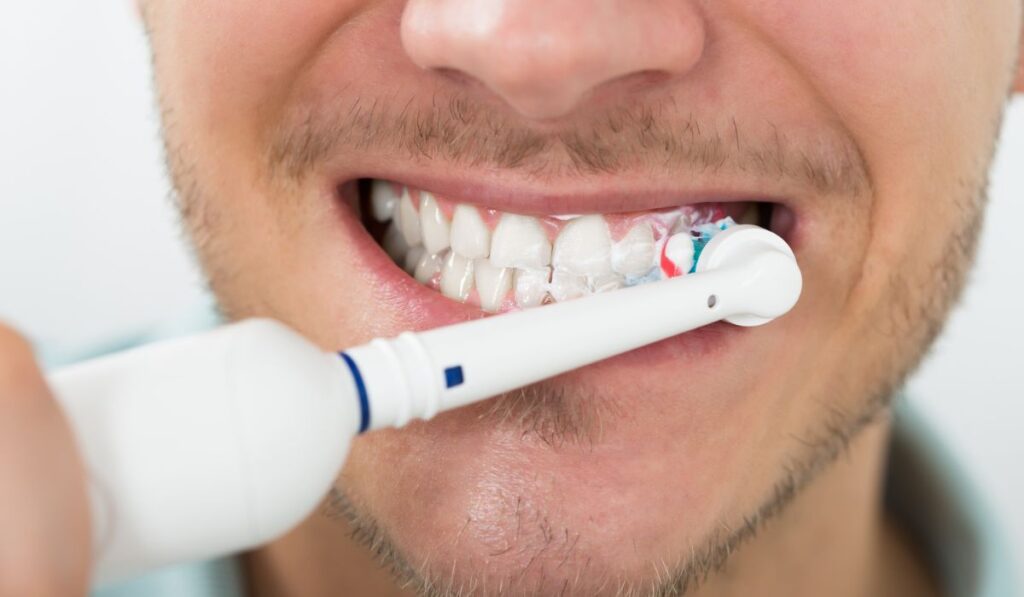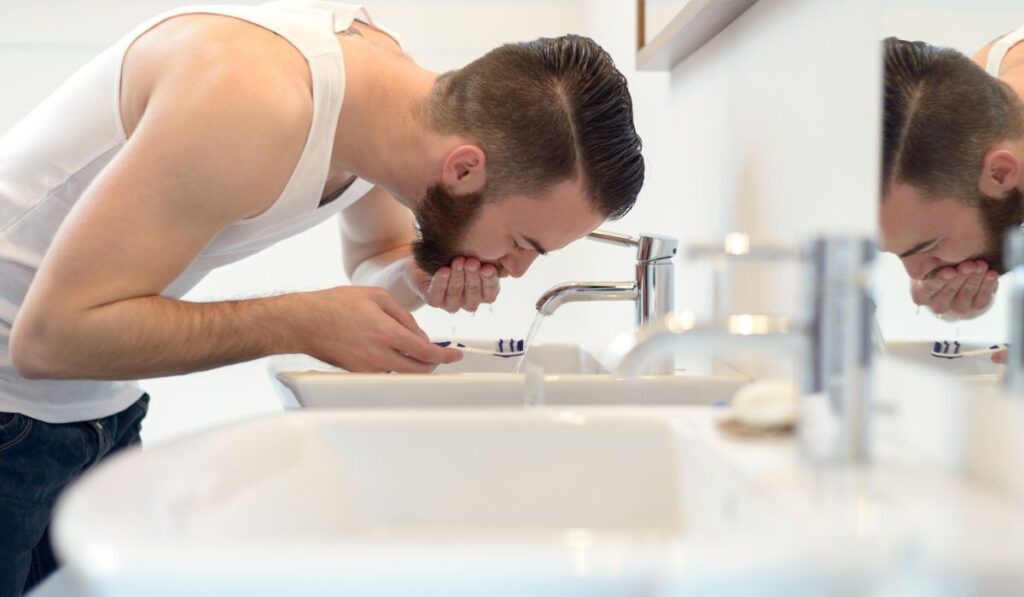There are two things that most of us simply have to do before we go to bed at night — brush our teeth and check our social media for one last time! Brushing your teeth at night helps stave off bacteria that can cause tooth decay, protecting your teeth as you rest for the day. But is there any reason you should leave toothpaste on your teeth after you brush?
You should spit out excess toothpaste after brushing. However, if you’re using a fluoride toothpaste, you shouldn’t rinse your mouth with water immediately after you brush your teeth. A thin coating of fluoride left on the surfaces of your teeth can help prevent tooth decay.
Let’s take a closer look at whether leaving toothpaste on your teeth after brushing has any positive effects and whether you should rinse your mouth with water after brushing.
Should You Leave Toothpaste on Your Teeth After Brushing?

Unless you opt for an organic or natural variety of toothpaste, most toothpastes are made with varying combinations of water, fluoride, detergents, abrasives, humectants, and flavors. All these have useful functions to clean and freshen up your mouth.
The fluoride found in most toothpaste varieties, such as Colgate Cavity Protection (on Amazon), helps strengthen the enamel of your teeth, and detergents help clean the surfaces of teeth and gum. The abrasive agents in your toothpaste help clean more deeply and remove stains while the humectants and flavors make the brushing of your teeth easier and a more pleasant experience.
However, ingestion of these ingredients excessively can cause irritations to your stomach. Excess fluoride in particular can be harmful, causing digestive discomfort.
Therefore, while leaving a thin residue of toothpaste on your teeth is okay, it’s not recommended to leave an excessive amount of toothpaste in your mouth after brushing.
It’s particularly important to supervise children when they brush their teeth since they can swallow too much toothpaste due to its pleasant smell and flavor.
How Long Should You Leave Toothpaste on Your Teeth?
You should brush your teeth for a minimum of 2 minutes using a pea-sized amount of toothpaste to properly clean your teeth and gums and also to get the benefits of the various ingredients included in toothpaste.
If you brush for less than 2 minutes and rinse your mouth with water right away, you’re not practicing proper dental hygiene, and that can lead to eventual cavities and tooth decay.
Remember to be gentle with your hand movements and hold of the toothbrush to allow the toothpaste to get into all the corners and surfaces of your mouth without causing tears or damage to your gums.
If the toothpaste you use doesn’t contain fluoride, you can rinse after 2 minutes. However, with fluoridated toothpaste, you should spit out the excess but don’t rinse your mouth afterward.
Can Leaving Toothpaste on Your Teeth Damage Them?
The ingredients in toothpaste are meant to improve your dental health and won’t cause damage if ingested in small quantities. However, using excessive amounts of toothpaste and leaving it on your teeth can cause damage.
For example, there are abrasives in toothpaste that help remove stains from tooth enamel and clean your gums of plaque and films of bacteria. They gently scrub and polish the surfaces of your teeth and mouth since the bristles of your toothbrush alone cannot clean and remove some stains and plaque build-up in your gums.
When you use the recommended pea-sized amount of toothpaste, these gentle abrasives can be quite effective. If you use a large amount of toothpaste for a long time, however, these abrasives can damage the enamel of your teeth and irritate the gums.
The same applies to fluoride. At the recommended amount and by using daily, fluoride in your toothpaste can be highly beneficial to prevent cavities, dental erosion, and tooth decay.
Is It Bad to Leave Toothpaste Overnight?
There’s no particular benefit to leaving an excess amount of toothpaste on your teeth overnight since you tend to ingest most of it with saliva in no time. However, there are special kinds of toothpaste and tools that are designed to be left overnight and can provide beneficial effects on your teeth and oral health.
For example, there are special types of toothpaste that come with small calcium phosphate glass balls, which can be brushed onto the teeth and left overnight. They become active while you rest at night and help fill in and strengthen weakened areas of your teeth’s enamel.
They are designed to naturally dissolve in saliva and the moisture in the mouth, and they create protective barriers in under eight hours.
Should I Rinse With Water After Brushing?

If you use toothpaste with fluoride, rinsing your mouth with water after brushing can dilute the fluoride and decrease its efficacy. You can still spit out any toothpaste foam that is left in your mouth.
However, leave any fluoride toothpaste residue that is left on the teeth to help increase the remineralization process of your teeth’s enamel with the help of calcium and phosphates from your saliva.
If you must rinse out your mouth with water after brushing, you can use a mouthwash with fluoride (on Amazon) to supplement the loss or dilution of fluoride caused when you rinse your mouth.
You can also wait between 30 minutes and an hour after brushing your teeth, letting the concentrated fluoride in your toothpaste work, and then rinse with water if you wish. Remember not to eat or drink anything after using fluoride toothpaste or mouthwash containing fluoride for the best benefits.


